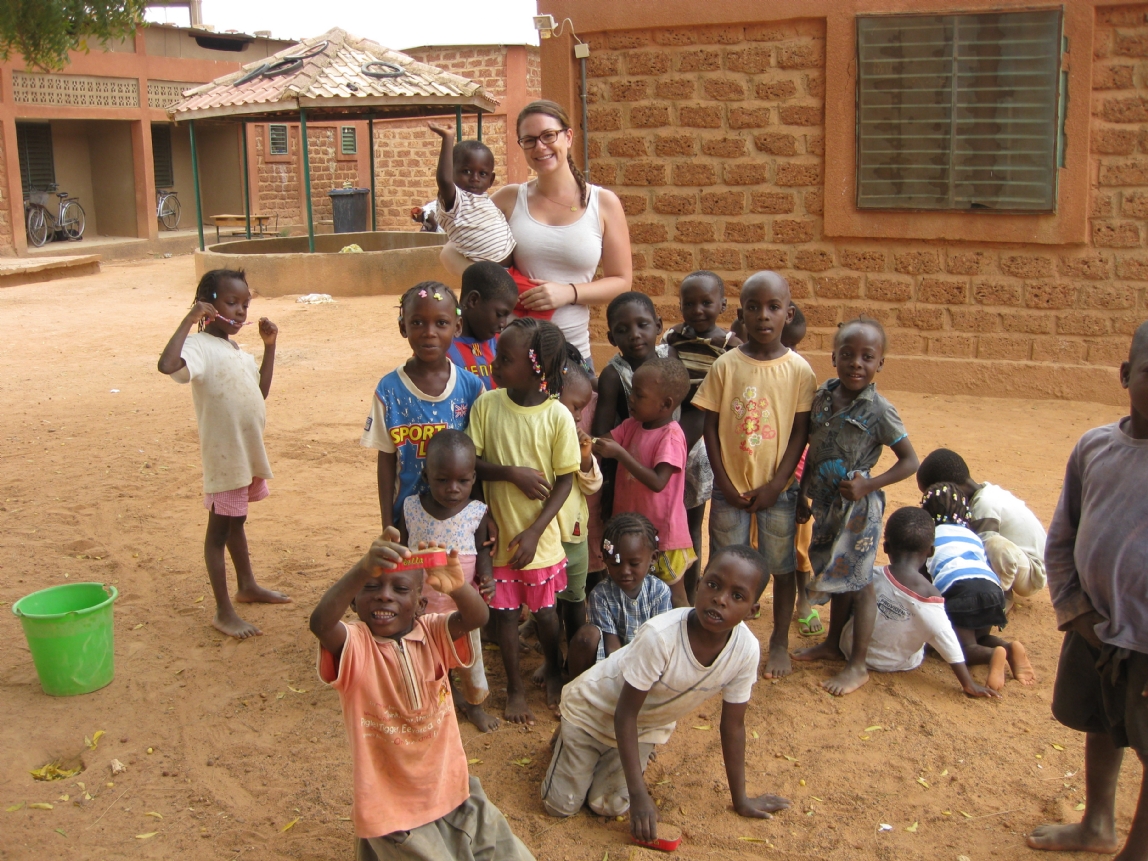"You rarely regret what you try – but often what you never dared to do."
In 2025, the Liechtenstein Development Service (LED) celebrates its 60th anniversary. Over the decades, many people have contributed their expertise through assignments abroad – and in return, gained a new outlook on life.
One of them is Alexandra Jehle-Somda. In 2013, she travelled to Burkina Faso through the LED, first as an intern, later on a long-term assignment. Today she lives in Liechtenstein with her family – and remains closely connected to Burkina Faso in many ways. In this interview, she shares her motivation, insights and how her time abroad continues to resonate.
Alexandra, what motivated you to do an assignment abroad? And how did you choose the destination?
At 25, I was looking for change – something meaningful and outside the tiny borders of Liechtenstein. I contacted the LED and was offered an international internship. At the time, I had two options: South America or West Africa. I was drawn to Africa and to the topic of the assignment, so I chose Burkina Faso.
What started as a seven-month internship wasn’t enough – I extended my stay by three more months. Even after returning home, I felt there was more to do. I developed a concept with project proposals and presented it to the LED – successfully. I was granted a second assignment, this time with a contract and a clearly defined role.
When were you on assignment – and what were your responsibilities?
My assignment lasted from November 2014 to January 2017. I worked at the Centre for Children in Need “Les Saints Innocents” (LSI), run by Catholic sisters and largely developed through the support of the Association for Humanitarian Aid (VfhH) and the LED. Today, with about 100 employees and various programmes, LSI is the largest employer in the region.
My tasks included improving administrative and organisational processes and implementing an infrastructure project – a business and guest centre with meeting rooms, accommodations and catering. This centre contributes to LSI’s financial independence, supports local development and creates jobs. I was involved from planning to implementation to operations – wearing many hats along the way.
What challenges did you face – expected or unexpected?
The start was tough. I arrived in February – during the hottest time of year, with temperatures reaching up to 50 degrees, while there was snow back home. Combined with the unfamiliar diet, it was physically exhausting.
I was also confused by how some people treated me. Some would bow when greeting me, which made me uncomfortable. Only later did I understand – it wasn’t about subservience, but a deep expression of hospitality. In many cultures in Burkina Faso, it’s normal to show guests great respect, regardless of their background or status.
Overall, the biggest challenges were the climate and cultural differences. But working with the local community was enriching from the start. The Burkinabè are smart, pragmatic and incredibly committed – and their great sense of humour made our work together both productive and joyful.
How did the LED support you before, during and after the assignment – and where would you have needed more support?
The LED prepared me well. Between the internship and the official assignment, I took part in a Comundo training (formerly INTERTEAM), which was a valuable opportunity to reflect and learn more.
What I found challenging was balancing the different expectations of the three partners involved – the LED, the association and the centre. In those moments, I was grateful for the LED’s guidance. If I were to do another assignment, I’d invest even more time upfront in jointly clarifying goals and roles.
What were the highlights of your time in Burkina Faso?
I’m still deeply moved by how people in Burkina Faso handle daily hardships. For many, life is a constant struggle for survival. Seeing how the centre gives hope and stability – to children in need, to employees with steady income, and to many others who seek support from the sisters – was incredibly powerful. The solidarity and community spirit I witnessed there saves lives every single day.
What lessons did you take with you into your current work and life?
I learned so much! The LED gave me access to the nonprofit world – and I found my calling there. After the assignment, I took over the management of the VfhH and continued to develop the projects on site for six more years. Even in my current role at the Liechtenstein Red Cross, I benefit from my broad experiences in Burkina Faso: developing concepts, implementing structures, creating processes and inspiring others to work toward a shared goal.
Are you still in touch with the people in Burkina Faso?
More than that – I found love there and built a family. Our children hold dual citizenship. Burkina Faso is home, just like Liechtenstein. We stay in regular contact and return often – privately and for the association’s work.
What message would you give to people in Liechtenstein who are thinking about volunteering or working abroad – but haven’t made up their minds yet?
An assignment abroad changes how you see the world – and yourself. I can only encourage others to take the leap. You rarely regret what you try – but often what you never dared to do. If you’re open to learning, listening and contributing – you’ll gain so much, both professionally and personally.

